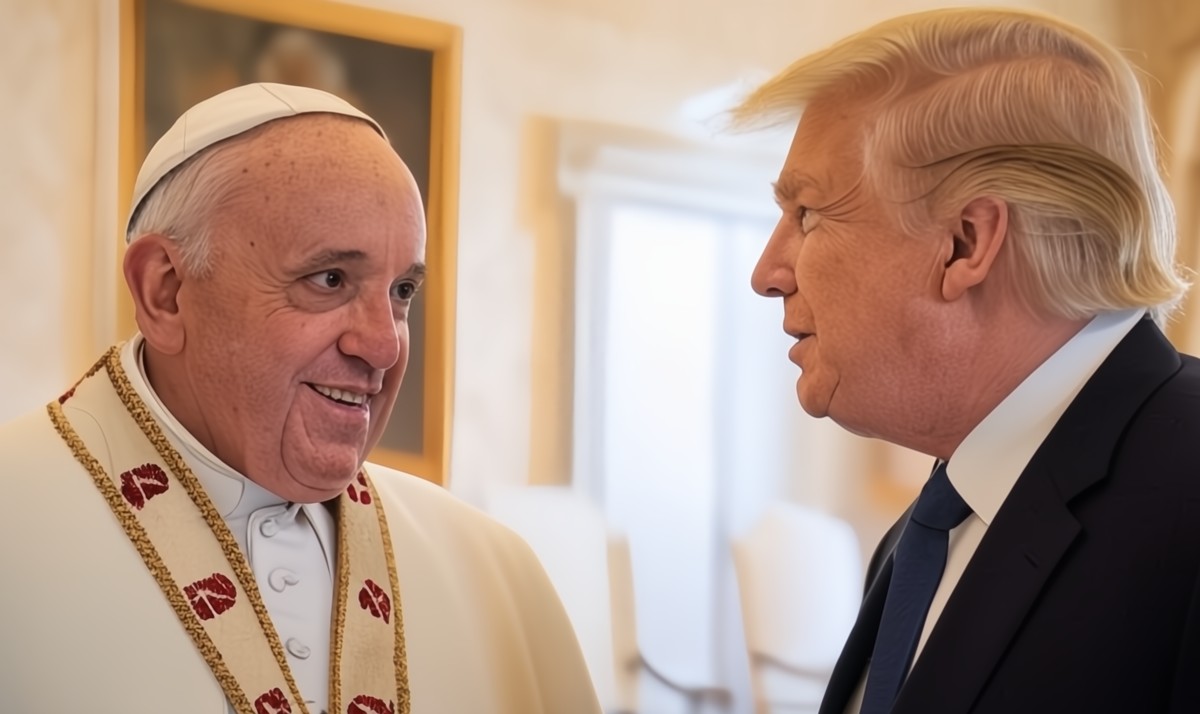Avoiding the Demographic Decline
FREE Catholic Classes
Interview With Journalist Riccardo Cascioli
ROME, MAY 6, 2006 (Zenit) - To counteract the demographic decline in many developed countries, a cultural change, rather than an economic incentive, is needed to promote family and procreation, says Riccardo Cascioli.
In this interview with us, the president of Italy's European Center of Studies on Population, Environment and Development, comments on the message sent by Benedict XVI to the participants in the 12th plenary assembly of the Pontifical Academy of Social Sciences.
Q: According to Eurostat data, no European country has a fertility rate equivalent to zero growth -- 2.1 children per woman. What direction is the demographic dynamic taking in Europe?
Cascioli: In fact, all the countries have fertility rates under the level of generation replacement, though the situations are different if the regions are compared.
Today the countries in which the decline of fertility is the gravest are those of Eastern Europe, with fertility rates of between 1.1 and 1.4 children per woman, but in them the sudden fall is relatively recent and had a sharp acceleration with the collapse of the Soviet empire.
Low also are the fertility rates in Southern Europe, with Spain and Italy, which for some time now have had a rate of between 1.2 and 1.3 children per woman.
Meanwhile, Northern Europe, especially the Scandinavian countries, enjoy relatively higher rates, 1.6 to 1.8, and have not experienced sudden variations, though the decline of the fertility curve began there much earlier than in other European countries.
The highest fertility rates are those of Ireland -- 2, but with a tendency to a rapid diminution -- and France -- 1.9 -- the only country at present that is going in the opposite direction of the general tendency.
In any event, the phenomenon is so consolidated that, in 20 or 25 years, several European countries -- Italy, Germany among the first -- will experience an effective reduction of the population, a phenomenon that already began had it not been masked by the high rate of immigration. But soon, not even this will be enough.
Q: To the low birth rate is added a notable increase in the rate of people over 60. What consequences will this tendency have?
Cascioli: Two factors must be distinguished: First of all, the longevity caused by the improvement in economic, health and hygienic conditions. This is a positive phenomenon which also includes the improvement of the quality of life of the elderly. The imbalance you describe has to do rather with the low birthrate.
This is the real problem: We are witnessing it already in the social security system, with an obvious imbalance between the active population -- that works and hence pays taxes -- and the retired population.
But the negative effects are much greater, especially in the economy: The work force diminishes and the active population ages with consequences on the capacity of innovation and competitiveness. This is the background of the problem that Europe is already paying for, in relation, for example, to the United States, where instead the rate of fertility is greater.
There is also a cultural and social problem that has to do with immigration: Though the latter is necessary to replace the labor force in decline, the rate of immigrants tends to increase rapidly, especially among young people, making more difficult the integration and transmission of the culture of the host country. Often, xenophobia arises as an angry reaction to this situation.
Let's not forget moreover the consequences on security: A nation without children is a nation that does not even have a desire to fight for its own values and freedom -- so much so that it believes it is not worthwhile to transmit them. And, because of this, it prepares to be a land of conquest for emerging civilizations.
Q: From the '60s to the '90s the international community manifested the dangers of a "demographic bomb," while the reality speaks of a "demographic winter." How have fears of overpopulation influenced the culture and behavior of the population, specifically of couples?
Cascioli: They have certainly had an important role because, for decades, we have been subjected to a cultural bombardment so that not to have children seemed to be almost a social responsibility.
Today in fact the spectrum of the depletion of resources continues to be waved irresponsibly to convince couples not to procreate.
There are even theories on the urgency to decrease the world population drastically, so that little by little the way will be opened to the idea that euthanasia may also be used as a method of population control.
Q: Many European countries hope to resolve the low birthrate with financial incentives and increases in the number of immigrants. During his intervention at the Pontifical Academy of Social Sciences, Benedict XVI explained the phenomenon of the demographic decline as a lack of love and hope. What is your opinion in this respect?
Cascioli: The experience of some European countries, though they have had decades of policies that favor births -- with incentives to births, flexible work to be able to look after children and a network of social services -- should teach us that these measured are not enough.
Undoubtedly improvements are seen in the fertility rates, but they are not sufficient to reverse the tendency to the demographic winter.
Sadly, the European Union, which soon will publish a white book on the subject, is moving precisely in this direction, ignoring the cultural factor, that is, the most profound motives for a couple's deciding to have or not have children.
Benedict XVI has finally put his finger on the problem: The real issue has to do with the meaning we give to life, because there is no financial incentive that could convince me to have children, if I live withdrawn in myself and am afraid of the future.
And here is the great task of the Church, because only the proclamation of Christ can reawaken to life a society that is sliding inexorably towards death.
The Pope's address sounds, therefore, as a severe call also to those sectors of the Church that, when they address the demographic question, underscore almost exclusively the political options that governments must take.
The state has indeed the duty to remove obstacles -- economic and social -- to my freedom to decide how many children to have, but it cannot also give me the profound reasons to have them. Love and hope are before the state.
Contact
Catholic Online
https://www.catholic.org
CA, US
Catholic Online - Publisher, 661 869-1000
info@yourcatholicvoice.org
Keywords
Demographic, Population, Family, Cascioli, Economic
More Catholic PRWire
Showing 1 - 50 of 4,716
A Recession Antidote
Randy Hain
Monaco & The Vatican: Monaco's Grace Kelly Exhibit to Rome--A Review of Monegasque-Holy See Diplomatic History
Dna. Maria St. Catherine Sharpe, t.o.s.m., T.O.SS.T.
The Why of Jesus' Death: A Pauline Perspective
Jerom Paul
A Royal Betrayal: Catholic Monaco Liberalizes Abortion
Dna. Maria St.Catherine De Grace Sharpe, t.o.s.m., T.O.SS.T.
Embrace every moment as sacred time
Mary Regina Morrell
My Dad
JoMarie Grinkiewicz
Letting go is simple wisdom with divine potential
Mary Regina Morrell
Father Lombardi's Address on Catholic Media
Catholic Online
Pope's Words to Pontifical Latin American College
Catholic Online
Prelate: Genetics Needs a Conscience
Catholic Online
State Aid for Catholic Schools: Help or Hindrance?
Catholic Online
Scorsese Planning Movie on Japanese Martyrs
Catholic Online
2 Nuns Kidnapped in Kenya Set Free
Catholic Online
Holy See-Israel Negotiation Moves Forward
Catholic Online
Franchising to Evangelize
Catholic Online
Catholics Decry Anti-Christianity in Israel
Catholic Online
Pope and Gordon Brown Meet About Development Aid
Catholic Online
Pontiff Backs Latin America's Continental Mission
Catholic Online
Cardinal Warns Against Anti-Catholic Education
Catholic Online
Full Circle
Robert Gieb
Three words to a deeper faith
Paul Sposite
Relections for Lent 2009
chris anthony
Wisdom lies beyond the surface of life
Mary Regina Morrell
World Food Program Director on Lent
Catholic Online
Moral Clarity
DAN SHEA
Pope's Lenten Message for 2009
Catholic Online
A Prayer for Monaco: Remembering the Faith Legacy of Prince Rainier III & Princess Grace and Contemplating the Moral Challenges of Prince Albert II
Dna. Maria St. Catherine Sharpe
Keeping a Lid on Permissiveness
Sally Connolly
Glimpse of Me
Sarah Reinhard
The 3 stages of life
Michele Szekely
Sex and the Married Woman
Cheryl Dickow
A Catholic Woman Returns to the Church
Cheryl Dickow
Modernity & Morality
Dan Shea
Just a Minute
Sarah Reinhard
Catholic identity ... triumphant reemergence!
Hugh McNichol
Edging God Out
Paul Sposite
Burying a St. Joseph Statue
Cheryl Dickow
George Bush Speaks on Papal Visit
Catholic Online
Sometimes moving forward means moving the canoe
Mary Regina Morrell
Action Changes Things: Teaching our Kids about Community Service
Lisa Hendey
Easter... A Way of Life
Paul Spoisite
Papal initiative...peace and harmony!
Hugh McNichol
Proclaim the mysteries of the Resurrection!
Hugh McNichol
Jerusalem Patriarch's Easter Message
Catholic Online
Good Friday Sermon of Father Cantalamessa
Catholic Online
Papal Address at the End of the Way of the Cross
Catholic Online
Cardinal Zen's Meditations for Via Crucis
Catholic Online
Interview With Vatican Aide on Jewish-Catholic Relations
Catholic Online
Pope Benedict XVI On the Easter Triduum
Catholic Online
Holy Saturday...anticipation!
Hugh McNichol
Join the Movement
When you sign up below, you don't just join an email list - you're joining an entire movement for Free world class Catholic education.

-

-
Mysteries of the Rosary
-
St. Faustina Kowalska
-
Litany of the Blessed Virgin Mary
-
Saint of the Day for Wednesday, Oct 4th, 2023
-
Popular Saints
-
St. Francis of Assisi
-
Bible
-
Female / Women Saints
-
7 Morning Prayers you need to get your day started with God
-
Litany of the Blessed Virgin Mary
St. Agnes: Virgin Martyr and Patron Saint of Chastity
-

Pope Francis Faces Heavy Criticism from MAGA Over View on Trump's Deportation Plan
-

Catholic Intellectuals Celebrate Trump's Policy Shifts on Parental Rights, Education, and Gender
-
Trump Withdraws U.S. from Paris Climate Agreement and WHO, Prioritizing American Interests
-
Tracing the Final Moments of Jesus: A Journey Through Jerusalem's Holiest Sites
Daily Catholic
 Daily Readings for Wednesday, January 22, 2025
Daily Readings for Wednesday, January 22, 2025 St. Vincent Pallotti: Saint of the Day for Wednesday, January 22, 2025
St. Vincent Pallotti: Saint of the Day for Wednesday, January 22, 2025 Prayer for Aborted Babies: Prayer of the Day for Wednesday, January 22, 2025
Prayer for Aborted Babies: Prayer of the Day for Wednesday, January 22, 2025- Daily Readings for Tuesday, January 21, 2025
- St. Agnes: Saint of the Day for Tuesday, January 21, 2025
- A Prayer for Friends and Benefactors: Prayer of the Day for Tuesday, January 21, 2025
![]()
Copyright 2024 Catholic Online. All materials contained on this site, whether written, audible or visual are the exclusive property of Catholic Online and are protected under U.S. and International copyright laws, © Copyright 2024 Catholic Online. Any unauthorized use, without prior written consent of Catholic Online is strictly forbidden and prohibited.
Catholic Online is a Project of Your Catholic Voice Foundation, a Not-for-Profit Corporation. Your Catholic Voice Foundation has been granted a recognition of tax exemption under Section 501(c)(3) of the Internal Revenue Code. Federal Tax Identification Number: 81-0596847. Your gift is tax-deductible as allowed by law.










 Daily Readings for Wednesday, January 22, 2025
Daily Readings for Wednesday, January 22, 2025 St. Vincent Pallotti: Saint of the Day for Wednesday, January 22, 2025
St. Vincent Pallotti: Saint of the Day for Wednesday, January 22, 2025 Prayer for Aborted Babies: Prayer of the Day for Wednesday, January 22, 2025
Prayer for Aborted Babies: Prayer of the Day for Wednesday, January 22, 2025


